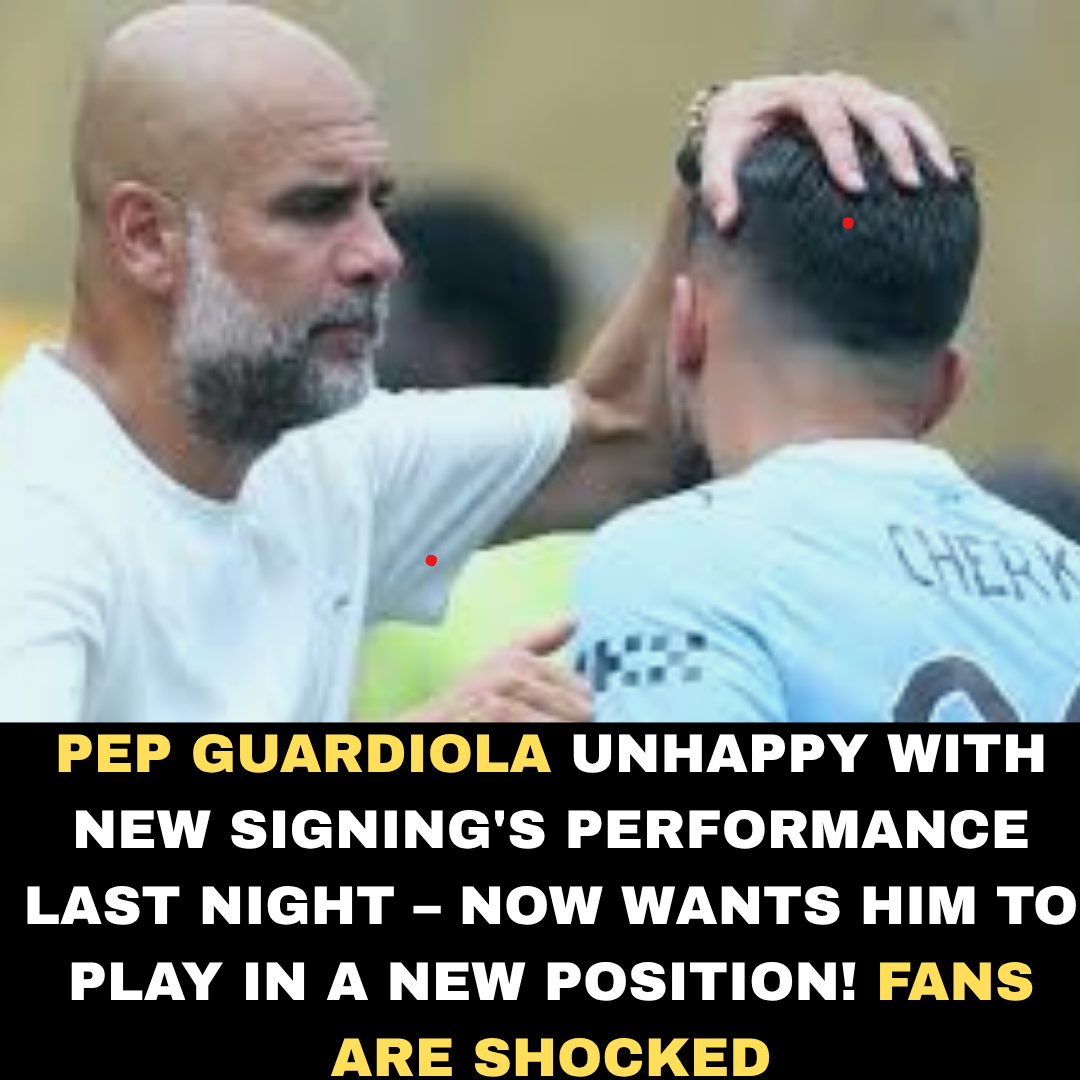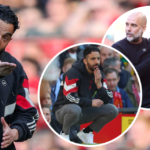Pep Guardiola drops major hint about Rayan Cherki after tough Man City debut

The summer of 2025 marked a significant transition period for Manchester City, as the club sought to navigate the post-Kevin De Bruyne era while maintaining their status as one of Europe’s elite football clubs. The departure of the Belgian maestro left a creative void that many believed would be impossible to fill, prompting the club’s hierarchy to scour the European market for a suitable replacement. Their search led them to Lyon’s talented playmaker Rayan Cherki, a 21-year-old French international whose technical ability and creative flair caught the attention of City’s recruitment team.
The acquisition of Cherki for £34 million, completed just before the deadline to participate in the FIFA Club World Cup, represented more than just a transfer—it symbolized Manchester City’s commitment to youth development and their belief in nurturing the next generation of football talent. However, as Pep Guardiola’s recent comments suggest, this signing may have been driven more by the club’s long-term vision than the manager’s immediate tactical requirements.
The Kevin De Bruyne Legacy: An Impossible Act to Follow
To understand the significance of Cherki’s arrival, one must first appreciate the magnitude of Kevin De Bruyne’s contribution to Manchester City’s success over the past decade. The Belgian midfielder was the creative heartbeat of Guardiola’s system, a player whose vision, passing range, and ability to unlock defenses with a single pass made him irreplaceable in the eyes of many football analysts.
De Bruyne’s departure left City with a creative void that extends beyond mere statistics. His ability to create chances from seemingly impossible positions, his leadership qualities, and his understanding of Guardiola’s tactical philosophy made him the perfect embodiment of the City way. The challenge facing Cherki is not just to replace De Bruyne’s output, but to adapt to a completely different style of play while carrying the weight of expectation that comes with being his successor.
Guardiola himself acknowledged this challenge when discussing Cherki’s role, stating, “Of course Kevin is difficult to replace we know that. For the quality he has, there is no doubt about it.” This honest assessment from the City manager reveals the pragmatic approach the club is taking—they understand they cannot simply find a like-for-like replacement for De Bruyne, but rather must evolve their tactical approach to accommodate new talent.
Rayan Cherki: The French Prodigy’s Journey to Manchester
Rayan Cherki’s path to Manchester City began in the youth academies of Lyon, where he quickly established himself as one of France’s most promising young talents. Born in 2003, Cherki’s rise through the ranks at Lyon was meteoric, characterized by his exceptional technical ability, creativity, and footballing intelligence that belied his young age.
The French international’s playing style is built around his exceptional close control, vision, and ability to create chances in tight spaces. These attributes, as Guardiola noted, make him particularly dangerous “close to the box” where his “incredible skills” and “great vision” can be maximized. However, his transition from Ligue 1 to the Premier League, and specifically to Guardiola’s demanding tactical system, was always going to present significant challenges.
At Lyon, Cherki had the freedom to express himself creatively, often operating as the focal point of the team’s attacking play. At Manchester City, he must learn to function within Guardiola’s highly structured system, where every movement is calculated and every pass must serve a specific tactical purpose. This adjustment period is crucial for his long-term success at the club.
Club World Cup Debut: A Baptism of Fire
Cherki’s full debut for Manchester City came in the most challenging of circumstances—a Club World Cup fixture against Wydad AC in the sweltering heat of the United States. The conditions were far from ideal for a player making his first appearance in City colors, with high temperatures and humidity creating additional physical demands on all players.
The match itself provided Manchester City with a winning start to their Club World Cup campaign, thanks to goals from Phil Foden and Jeremy Doku. However, for Cherki, the 60-minute appearance was a sobering introduction to the demands of playing for one of the world’s elite clubs. His performance was characterized by moments of promise interspersed with periods of struggle, as evidenced by the statistic that he lost possession 10 times—more than any of his teammates.
This statistic, while seemingly damning, must be viewed within the broader context of Cherki’s role and the expectations placed upon creative players in Guardiola’s system. Creative players are often required to take risks with their passing and movement, which naturally leads to higher turnover rates. The key question is whether these risks are calculated and whether they create opportunities for the team, even when they don’t come off.
Guardiola’s Tactical Philosophy and Cherki’s Integration
Pep Guardiola’s tactical approach has evolved significantly during his time at Manchester City, but certain core principles remain constant. His teams are built on positional play, where every player must understand their role within the collective structure. The integration of new players into this system is never straightforward, particularly for creative players who must balance individual expression with tactical discipline.
Cherki’s role within this system is still being defined, but Guardiola’s comments suggest that the young Frenchman will be utilized primarily in attacking areas where his technical skills can be maximized. The manager’s praise for Cherki’s “incredible skills close to the box” indicates that he sees the player as someone who can create and finish chances in the final third, rather than as a deep-lying playmaker in the De Bruyne mold.
This positional flexibility could prove crucial for Cherki’s success at City. Rather than being constrained by comparisons to his predecessor, he has the opportunity to carve out his own role within the team’s tactical framework. His ability to operate in multiple positions across the front line gives Guardiola additional tactical options, particularly in games where City need to break down stubborn defenses.
The Broader Context: City’s Recruitment Strategy
Guardiola’s revelation that Cherki’s signing was primarily driven by the club rather than his personal preference provides fascinating insight into Manchester City’s recruitment strategy. This approach suggests a more collaborative decision-making process, where the club’s long-term vision takes precedence over short-term tactical considerations.
This strategy has both advantages and potential pitfalls. On the positive side, it demonstrates City’s commitment to building for the future and their willingness to invest in young talent even when the immediate impact may be uncertain. The club’s recruitment team, led by director of football Txiki Begiristain, has developed a reputation for identifying and acquiring promising young players who can develop into world-class talents.
However, this approach also places additional pressure on both the player and the manager to make the relationship work. When a manager personally identifies and pursues a target, there is often a clearer vision of how that player fits into the tactical system. When the club makes the decision, the manager must adapt his approach to accommodate the new arrival’s strengths and weaknesses.
Phil Foden’s Renaissance: A Template for Success
While Cherki struggled in his debut, his teammate Phil Foden demonstrated the kind of performance that City fans have come to expect from their homegrown star. Foden’s goal and assist in the victory over Wydad AC were complemented by his candid admission about the challenges he faced during the 2024/25 season.
“It was a difficult season, I’m not going to lie. It was not the best,” Foden acknowledged. “I got a little bit of time off, rested. Yeah, new start, new me. The hunger inside me is back and I want to prove people wrong.”
Foden’s journey provides a valuable template for Cherki’s potential development at City. The English international faced his own challenges adapting to the demands of playing for Guardiola, experiencing periods of inconsistency and criticism before establishing himself as one of the team’s key players. His ability to bounce back from adversity and his determination to prove his critics wrong demonstrates the mental resilience required to succeed at the highest level.
For Cherki, Foden’s example illustrates that setbacks and difficult periods are part of the development process at Manchester City. The key is maintaining belief in one’s abilities while remaining open to learning and adaptation. Foden’s emphasis on having “the determination” to improve provides a roadmap for how young players can navigate the challenges of playing for one of the world’s biggest clubs.
Tijjani Reijnders: The Midfield Partnership
Another significant subplot in City’s Club World Cup campaign was the performance of Tijjani Reijnders, who earned praise from Guardiola for his display alongside Cherki in midfield. The Dutch international’s successful integration into the team provides an interesting counterpoint to Cherki’s more challenging debut.
Reijnders’ ability to adapt quickly to Guardiola’s tactical demands highlights the importance of tactical intelligence and positional awareness in the City system. His partnership with Cherki in midfield could prove crucial for both players’ development, as they learn to understand each other’s movement patterns and develop the kind of telepathic understanding that characterizes successful midfield partnerships.
The potential for a Reijnders-Cherki midfield axis represents an exciting prospect for Manchester City’s future. Both players bring different qualities to the partnership—Reijnders with his work rate and tactical discipline, Cherki with his creativity and technical ability. If they can develop a strong understanding, they could form the foundation of City’s midfield for years to come.
The Club World Cup Challenge: More Than Just Football
The FIFA Club World Cup represents a unique challenge for all participating teams, combining the pressure of high-stakes competition with the logistical challenges of playing in unfamiliar conditions. For Manchester City, the tournament provides an opportunity to integrate new signings like Cherki while competing for another trophy to add to their impressive collection.
The conditions in the United States, where the tournament is being held, present additional challenges that go beyond the tactical and technical aspects of the game. The heat and humidity can be particularly challenging for European players who are not accustomed to such conditions, potentially affecting performance levels and requiring careful squad management from coaches.
For Cherki, playing in these conditions during his debut added an extra layer of difficulty to an already challenging situation. The physical demands of adapting to a new league, new teammates, and new tactical system are significant enough without the added complication of extreme weather conditions.
Rico Lewis Red Card: A Moment of Frustration
The match against Wydad AC was not without its controversies, as Rico Lewis received a late red card that clearly frustrated Guardiola. This incident highlights the fine margins that exist in top-level football and the importance of maintaining discipline even when games appear to be won.
Lewis’s dismissal serves as a reminder to all City players, including newcomers like Cherki, about the standards of professionalism expected at the club. Guardiola’s visible frustration with the red card demonstrates his commitment to maintaining high standards of behavior and discipline, regardless of the score or the importance of the match.
For young players like Cherki, witnessing Guardiola’s reaction to such incidents provides valuable insight into the manager’s expectations and the level of professionalism required to succeed at Manchester City. These moments, while frustrating at the time, can serve as important learning experiences for the entire squad.
The Road Ahead: Expectations and Reality
As Rayan Cherki begins his Manchester City career, the expectations surrounding his performance will undoubtedly be significant. The £34 million transfer fee, combined with his role as De Bruyne’s replacement, creates a level of scrutiny that few 21-year-old players must endure. However, both the club and the player must remain realistic about the timeline for his development and integration.
Guardiola’s patient approach to player development suggests that Cherki will be given time to adapt to his new surroundings and tactical requirements. The manager’s track record of improving young players—from Foden to Bernardo Silva to numerous others—provides hope that Cherki can eventually reach his full potential at the Etihad Stadium.
The key for Cherki will be maintaining confidence while remaining humble and open to learning. His technical ability is undeniable, but success at Manchester City requires more than individual talent—it demands tactical intelligence, physical resilience, and mental strength. The early signs suggest that while the adaptation process may be challenging, the potential rewards justify the investment.
Conclusion: A New Chapter Begins
Rayan Cherki’s arrival at Manchester City represents the beginning of a new chapter for both the player and the club. While his debut may not have gone according to plan, it provides valuable lessons about the challenges and opportunities that lie ahead. Guardiola’s comments about the club’s decision to sign Cherki, combined with his praise for the player’s attributes, suggest a long-term vision that extends beyond immediate results.
The parallels with other young players who have successfully navigated similar challenges at City provide reason for optimism, while the unique pressures of replacing a player of De Bruyne’s caliber add an extra layer of complexity to Cherki’s situation. The coming months will be crucial in determining whether this ambitious transfer proves to be another masterstroke in City’s recruitment strategy or a reminder of the risks involved in big-money moves for young players.
What remains clear is that Manchester City’s commitment to youth development and their willingness to invest in the future continues to set them apart from many of their competitors. Cherki’s journey at the club is just beginning, and while the early signs may be mixed, the potential for success remains significant. The true measure of this transfer will not be determined by a single debut performance, but by the player’s ability to grow, adapt, and ultimately contribute to Manchester City’s continued success on the biggest stages of world football.















